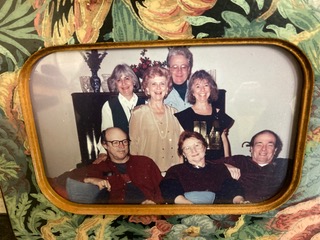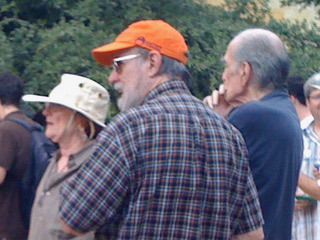AUSTIN — A dear friend passed in June at 86. Greg Olds was a quiet, thoughtful person. Even though he was very sick, he assured us he was fine. No fuss, self-deprecating and witty. Some of his youth was spent in Oklahoma where his father taught law. Greg was a graduate (in journalism) at UT. But he didn’t care for the school, thought it loud, aggressive and pretentious. So he became a strong fan of OU. When able, in early years, he drove to Norman for football games. He regularly went to the OU–Texas game at the State Fair Cotton Bowl. I went with him once. No repeats for me. His tickets were in the section where OU fans sat. I kept my allegiance for Texas to myself.
After graduating at Texas, he did post-graduate study at the University of Missouri.
I first met Greg at Scholz’ beer garden in 1967. He was with Ronnie Dugger, the hard-driving editor of the liberal publication, the Texas Observer. I was on friendly terms with Ronnie, who hailed me over to the table. Greg at that time was editor of the Richardson newspaper in North Dallas. I didn’t know it but Ronnie was vetting him as possible editor of the Texas Observer, because Ronnie hoped to spend more time on other writing. A critical book on LBJ was often mentioned. Greg was liberal in his politics and did take over as editor of TO at the end of 1968, possibly a bit later. In 1967 I was working for the OEO, “War on Poverty.” We became friends, as we were for the rest of Greg’s life.
At that point, Greg was a non-drinker though he drank a little beer. He became outgoing and jovial with a few drinks. After that I saw him frequently at the beer garden or at some party or open house. But beer was for sissies. He turned to Scotch whiskey and started drinking it daily, all-day and evening, parsing it out in small drinks. He was buzzed until he went to bed at night. I rented an office across from the old county courthouse and opened a private law practice in Austin. I, too, became more dedicated to the powers of alcohol but mainly beer, after hours. There are many models of the disease of alcoholism.
The Movement took off in Austin in the Sixties and the Seventies. Martin Wiginton and I spent a lot of time with Greg and influenced him to move left, although he never did become a full-fledged radical. What he did do was give our Movement activities coverage in the Observer. Which was not to the liking of Dugger or the traditional libs who comprised the magazine’s readership. Some argue that Ronnie pushed Greg out as editor. Others, including Greg, blamed his poor work quality due to partying, boozing, and carousing. I once did think it was the doing of Dugger in his apparent revulsion or fear of radical politics. Now I think it was all of the above.
During his working life he wrote and edited many diverse kinds of material.
In our lives something beautiful happened in the ‘90s and beyond. Our dear friend for many years, Carole, called to invite Nancy and me to a July 4th dinner at her house. She didn’t say whether others were invited. It didn’t matter. When we arrived two other couples were there: Greg and Brenda Olds, and Lucy and Terry DuBose. Carole could not have chosen better. Greg and Terry had been my friends before the Gang. Carole knew all of us as friends. But we were not close until these supper and talk gatherings. We enjoyed a fine meal and sat on an outdoor porch talking for hours. This was too good not to be repeated. Next month we did it again. It was easy to be with each other and we agreed on so much: politics, art, and the ongoing assault by developers on our fair city (Austin). Then we did it again the following month. We laughed a lot. By that time all of us were non-drinkers so no alcohol was ever involved. We had much in common. So we became close friends. For all, I believe, we were the social life of each other. We named ourselves the Gang of Seven.
When President “Little Bush” invaded Iraq based on a pack of lies, both Greg and his wife Brenda came out to our peace demonstrations. We all piled in Brenda’s van and drove to the so-called “Ranch” where Bush hid during the raucous demonstrations nearby.
There was much humor. In Trump’s first run, we found a piñata in his image, made of papier-mâché and standing about 4 feet tall. It was presented to Greg on his 80th birthday. All of us were glad to discover that it was full of candy, chocolate and other junk food. After a short while it was too much to have it around and it disappeared.
We gathered each month for the next few years, more exceptional for some of our lives took us away from Austin. Nancy and I moved to San Marcos for a year and Terry and Lucy moved to Little Rock, Arkansas, for several years. Travel got us all together in these periods. Carole remarried and left the group she had originally convened, but the Gang of Seven, now the Gang of Six, lasted 27 years — years of ferment that were an impossible combination of highs and lows, excitement and disappointment, optimism and depression.
Terry died in 2018; in 2019 Brenda died. We felt as though we had lost family members. Before he died, Greg called me. We affirmed our strong bond of friendship. I remarked “I’m just glad we are both still alive.” A day later we got a call at 8 a.m. from the hospital in Houston. Greg had died. Through it all we sustained each other.
Jim Simons was a movement lawyer from 1968 and continued practicing law in Austin until retiring in 2008. He worked for the Office of Economic Opportunity (OEO) and the War on Poverty, before entering private law practice. His cases at Wounded Knee and many at Fort Hood, among others, are the subject of his 2007 memoir, Molly Chronicles. He graduated from the University of Texas Law School in 1965.
- Read more articles by Jim Simons on The Rag Blog.




















Hello Jim, It is good to see you are still alive and kicking. I too miss Terry, our 1st VVAW leader, along with John and Cathy Kniffin, they were like family to me. I missed your work at Wounded Knee II. I was there but escaped at night.
I am well retired and living in Thailand for 13 yrs and came back in 2002. I’m doing ok in my retirement years. Spend a lot of time in Lao with my Lao family.
Take care,
Wayne Beverly
I don’t know Jim or any of the people in this article, but I shed a few tears reading it anyway. I understand the grief and have experienced similar grief related to strong enduring friendships — it is painful when death takes a friend away, especially a friend who shares political values and the concept of meaningful, caring friendship. So thank you for writing this and to Rag editor Thorne Dreyer for publishing it.